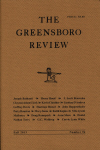The Greensboro Review – Fall 2013
The Greensboro Review has been around now for almost 50 years. Since the journal started up in 1965, it has developed an international reputation, meaning each issue plays host to the best work from both emerging and established writers. This issue is packed with work that seems to gravitate around feelings of longing and desire and the various ways these two emotions shape and impact our life. Every piece reaches out to touch the readers on a different level and engage them.
The Greensboro Review has been around now for almost 50 years. Since the journal started up in 1965, it has developed an international reputation, meaning each issue plays host to the best work from both emerging and established writers. This issue is packed with work that seems to gravitate around feelings of longing and desire and the various ways these two emotions shape and impact our life. Every piece reaches out to touch the readers on a different level and engage them.
“The Correct Way to Breathe” by Mary Jones, written in the first-person is, on the surface, a story about the main character’s struggle to cope and find a cure for or find peace with the fact that she suffers from a disease called Complex Regional Pain Syndrome (CRPS). However, as the reader digs deeper into the story, it becomes apparent that the author is using the impossibility of curing chronic bodily pain as a metaphor for life and the realization that pain, be it physical or emotional, can never be avoided. Throughout the story, Jones weaves in beautifully painful lines to lead the reader to the same realizations that the main character grows into: “I think–if he [the doctor] likes me, maybe he’ll try harder to fix me.”
Even while talking about the main character training her dog, Jones manages to grab hold of the reader’s heart and pull it into the story and stare at it: “The hardest trick to teach is stay.”
Doug Ramspeck’s poem “October Mud” is an intriguing poem that can be analyzed on many levels with its unique fusion of a nostalgic rural American feel through the speaker’s mention of barns, fields, horses, and hoof prints combined with the conjuring of ancient world sentiments and mysticism and a certain scientific dryness that works to both give the poem weight and create distance within the poem. Ramspeck brings each of these aspects together to formulate a poem about desire; it begins: “For a long time the spirits thought they were / the alterations, the cadences. They lived in the ribs / of moonlight, in the robes of falling leaves . . .” The poem ends by bringing the reader into a fully visible but very distant reality.
This issue of The Greensboro Review eloquently ends with a poem by Bruce Bond titled “The Inheritance,” which speaks to the drudgery life can become and evokes the feelings of guilt someone mourning a loved one feels from not being sure the deceased lived a fulfilling life.
The first lines, “My mother’s calendars gave heartache / a geography, a map . . .,” provoke a double meaning as the speaker tries to decipher why his deceased mother has kept these calendars over all the years:
So when she died
when I found them in a drawer, I wondered:
was their useless use meant for us.
Or was it just too difficult to toss
their sacrificial order, the hours they kept.
So yes, I tossed them, never to forget.
Each piece of work in this issue is guaranteed to reach out and draw the reader into it in a unique way.
[www.greensbororeview.org]





